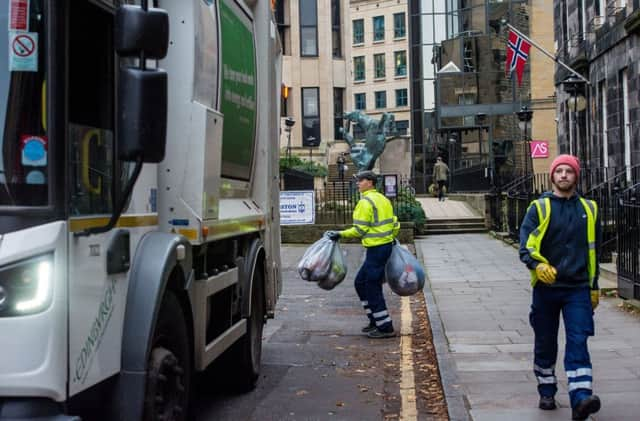Council services will suffer under fresh Scottish Government strategy


It is likely that future budget cuts will increase pressure on ministers to raise taxes in Scotland to offset austerity measures from Westminster.
Hundreds of millions of pounds would be lost in town halls, with colleges, transport, the justice system and economic support also poised to lose out under Finance Secretary Derek Mackay’s Medium Term Financial Strategy.
Advertisement
Hide AdAdvertisement
Hide AdA tranche of “key priority areas” – health, policing, early learning and childcare, universities, social security and the attainment gap – are to have their funding increased in the coming years, new analysis of the strategy by the economist Professor John McLaren shows. All other areas will have to make do with what’s left.
Town hall leaders have slammed the expected down- turn in funding after seeing about £750 million axed from their budgets in recent years to cover key services such as schools support, social care and garbage disposal.
“If Mr McLaren’s analysis comes to fruition many local government jobs will be at risk as will many of the essential services councils deliver for communities,” Cosla president Alison Evison told Scotland on Sunday.
Health in particular will see a big rise in its budget over the next five years under three different scenarios – upper, lower and medium – set out by ministers.
Spending on the six priority areas grows from 56 per cent of resource spending in 2019-20 to 64 per cent in 2022-23. Overall health spending makes up between 68-82 per cent of that share across a five-year period, the strategy states.
And it warns: “All other funding commitments will need to be met from the remainder of the budget.”
McLaren said this means that other “non-priority” areas will see their funding fall by 2 per cent a year in real terms after inflation under the central scenario. They could even see an actual “cash terms” fall in budgets the worst-case scenario shows.
“Local government will be the biggest loser, as it accounts for the majority of the non-priority resource budget,” McLaren said.
Advertisement
Hide AdAdvertisement
Hide Ad“Other areas affected will include further education, economic support, the environment, transport, and the courts.
“Many of these services have already faced significant year-on-year cuts and may struggle to make even more without affecting the range or quality of service provided,” he added.
Councils have seen their revenues for day-to-day spending tumble by £744.7m, down 7.1 per cent, in the past five years, a recent report by the independent Scottish Parliament Information Centre (SPICe) found. Early figures indicate the 2018/19 financial year’s cash deal for town halls is set to rise slightly by 0.3 per cent to about £9.8 billion. Mackay agreed to the Greens’ demands for an additional £160m. Even a 2 per cent cut would see the loss of about £200m.
Schools support – not teacher numbers – and social care, as well as a range of council services would be in the firing line.
The past two years have also seen a dramatic 7 per cent increase in the costs of fees charged by councils for the services they provide.
This can include the cost of entry to leisure centres, charges for residential care, statutory repairs to housing and even school meals.
Parking charges are among the fees which have seen huge hikes in recent years. A recent Freedom of Information request by The Scotsman indicated a £5.6m increase last year to more than £70m, prompting claims motorists were being used to offset the impact of austerity.
Cosla’s resources spokesperson Councillor Gail Macgregor said: “This is not what we want to hear as we build up to the intense period of discussion that will take place as part of this year’s Spending Review.
Advertisement
Hide AdAdvertisement
Hide Ad“Councils will have to make many really difficult choices if we are looking at more pain for local government in terms of our settlement. After two years of hurt we need to be looking at positive financial news from Scottish Government.”
A Scottish Government spokeswoman insisted that the modelling set out in the strategy were only “potential scenarios.”
She added: “Our Medium Term Financial Strategy (MTFS) clearly lays out the consequences of UK choices on Scotland’s public finances, including UK imposed decisions on austerity, immigration policies that don’t suit Scotland, and taking us out of the Single Market through Brexit.
“We have set out fiscal alternatives that would mean a fairer deal for Scotland with substantial investment to support our public services and stimulate our economy.
“We will continue to provide value to taxpayers and certainty for our vital public services during the turbulent and uncertain times ahead.
“The MTFS does not set out budget allocations for any area of expenditure, it models a range of potential funding scenarios and policy commitments over the next five years – budget decisions will be taken later this year when we have greater clarity on our block grant allocation and updated fiscal forecasts from the SFC.”
Labour finance spokesperson James Kelly said: “Scottish public services cannot face another crippling round of austerity, but that appears to be what we are heading to.”